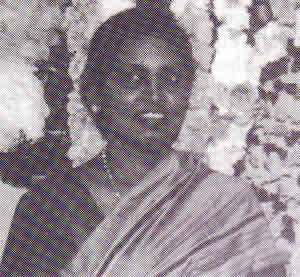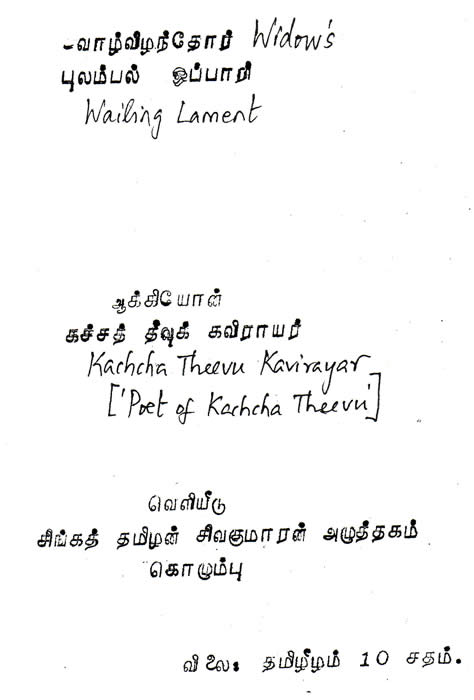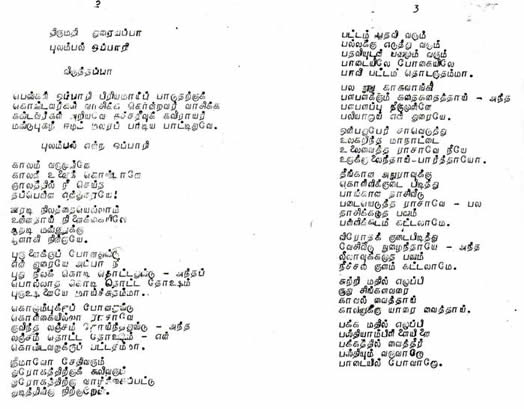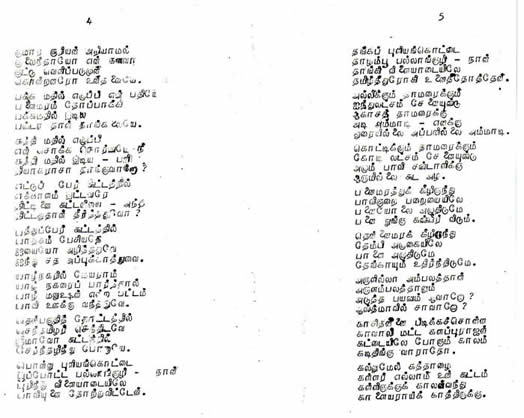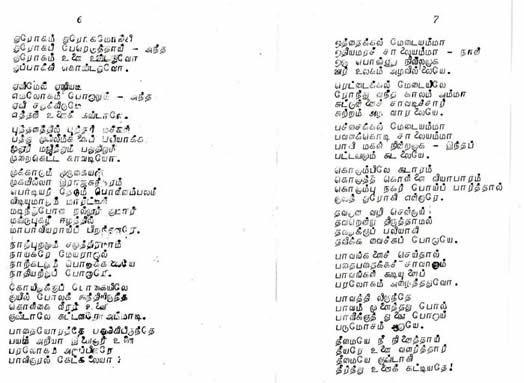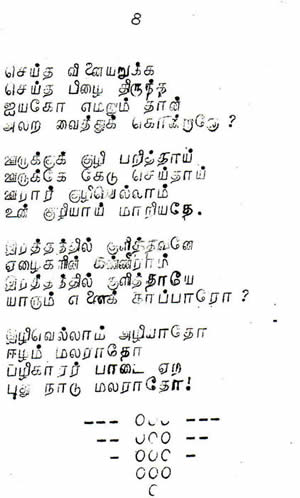Ilankai Tamil Sangam30th Year on the Web Association of Tamils of Sri Lanka in the USA |
||||
 Home Home Archives Archives |
The Alfred Duraiappah DossierPart 1by Sachi Sri Kantha, July 26, 2010
Alfred Thambirajah Duraiappah (1926-1975) has become the Tunney Hunsaker (1930-2005) of Tamil history. Just for the same reason, Hunsaker (a journeyman pugilist) is remembered because he was the first opponent of boxing great Muhammad Ali (born 1942) to fall in 1960, Duraiappah’s name is remembered now, because he was the first military target of LTTE leader Prabhakaran. Colombo media is propagating the myth that Duraiappah was the savior of Tamils. But, Tamils with self respect and dignity look down on Duraiappah as a traitor and pimp for Sinhalese political interests. Personally, Duraiappah would have been an affable politico swimming against the Tamil nationalism current of his times (circa 1970-75). But, his deeds have not been forgotten. He was in the national limelight only during 1960-64, as the MP for Jaffna. In the early 1960s, many Tamils looked down on him, as an upstart. Last year, in the aftermath of the LTTE’s military defeat, the Colombo Daily News (May 26, 2009) belonging to the Lake House Group began a series of ‘Chronology of LTTE Terror’, with the Alfred Duraiappah murder (authored by Wijitha Nakkawita) as part 1. It is not as a joke that in Sri Lanka the journalism of Lake House is derisively tagged as ‘Fake House’. Even though, many Tamil journalists did contribute their sweat and blood to build up the Lake House, the real fact remains that ‘Fake House’ never championed the Tamil cause, even before the LTTE became a noted name in Sri Lanka's political lexicon. As such, it is my onus to present some details on the political career of Alfred Duraiappah, for balance. In this part 1, I introduce an unusual 8-page document, which appeared after Duraiappah’s assassination on July 27, 1975. After 35 years, it deserves preservation. The original is in Tamil verse, which I provide as a scanned document in five frames. To the best of my ability, I have translated it into English, though I’m the first to admit that much of the poetic vigor and word play get dimmed in translation. The very name Duraiappah could be split as (Durai + Appah), with the meaning Durai=Lord and Appah = Lord. The word, Amma (literally, ‘mother’) can also mean a wailing cry ‘O’ My God’. Quite a number of tree names (palmyrah, coconut, lotus, water lily, tamarind, fragrant screw pine, kotti, Aloe, and othiya tree) of local flavor appear in the verse, replete with colorful idioms. Especially, othiya tree (Odina pinnata) in Tamil lore has the image as a tree of no use. According to Peter Percival’s Tamil-English dictionary, othiya tree is proverbially said of those who have a specious appearance, but are fit for nothing. Duraiappah’s deeds were satirized as that of othiya tree. Oppari (wailing lament) is a folk music tradition, prevalent among Tamils. It is sung by women, when men die. Sadly, this music genre is in decline. This document, composed in 1975, provides a derisive oppari, as sung by Dr (Mrs) Parames Duraiappah. Four specific lines in the verse make reference to pallanguli (a 14-hole board game played by Tamil girls and women) with the double entendre meaning as ‘I’ve lost you’ – a side reference to Alfred Duraiappah’s extra-political activity as a pimp for Sinhalese interests. To be fair, Mrs. Duraiappah was a respected personality of her times. She was a niece of G.G. Ponnambalam Sr. (1902-1977). Being medically qualified, Mrs. Duraiappah quit the Sri Lankan health services (after working at Lady Ridgeway Hospital and Castle Street Maternity Home in Colombo and at Jaffna Hospital), and served at Brunei Government Medical Services from 1967 until her death on January 15, 1988.
It is a fact that it was partly due to the social rapport earned by Mrs. Duraiappah as a physician (and as a niece of G.G. Ponnambalam Sr), that her wayward husband Alfred Duraiappah could cash in and squeak through as a victor in two general elections in Jaffna constituency against the formidable G.G. Ponnambalam Sr. in 1960. I have heard from my father, who served in Health Department clerical services in Colombo during 1960s, that stories circulating in the grapevine hinted about marital discord between Alfred Duraiappah and Parames Duraiappah, and that was a reason for the latter leaving for Brunei in 1967. Duraiappahs had a daughter Rochana (Esha), who married an accountant, David Begho in UK. The wailing lament verse that I introduce here was on sale for 10 cents after Duraiappah’s assassination. Unfortunately, the author was identified with a pseudonym, Kachcha Theevu Kavirayar (The poet of Kachcha Theevu). It was a period piece. It includes the names of Tamil politicians of early 1970s, who were identified as traitors to the Eelam campaign. Here is a list: C. Kumarasuriyar (a nondescript cabinet minister in Sirimavo Bandaranaike regime of 1970-77, who was an architect by profession), A. Thiyagarajah (the MP for Vaddukoddai, 1970-77, who defeated A. Amirthalingam in the 1970 election), C. Arulampalam (the MP for Nallur, 1970-77), P.R. Selvanayagam (the MP for Batticaloa, 1970-77), Murugaiya, Rajasundaram, V. Ponnambalam (the CP candidate who lost against S.J.V. Chelvanayakam in the 1975 by-election for Kankesanthurai), C.X. Martyn (the MP for Jaffna, 1970-77, who won on FP ticket and switched over to government ranks), Nallur Kumar, and police inspector Bastiampillai (who gained reputation as a torturer). Two Muslim politicians mentioned were Badiuddin Mahmud (an influential cabinet minister in Sirimavo Bandaranaike regime of 1970-77), and A.L. Abdul Majeed (MP for Mutur, 1970-77). Among the Sinhalese politicians mentioned were Sirimavo Bandaranaike (the prime minister during 1970-77) and her son Anura Bandaranaike (then crown prince!). Another featured name was Leela Narayanan, a dancer, who was ‘fixed’ for Anura’s sexual delight with Duraiappah serving as a pimp. This story was an open secret among Jaffna Tamils in 1970s. Two events that were remembered in this verse include the death of 9 Tamils at the 4th International Conference Seminar of Tamil Studies, held in Jaffna in January 10, 1974 and death of 10 Muslims at a Puttalam mosque due to police shooting in February 1976.
Wailing Lament of Mrs. Duraiappah Before it’s time, the Reaper had got you You thought that all the land was yours You have traveled to Brunei – My Durai and Appa You’ve been to Colombo – a king in ill fame Sirimavo would call you – treason pay will reach you Title’s will be offered – palanquin will serve you For hundreds of cash transfer – you ‘sweet-talked’ for many Killing of nine folks in that World Conference For the ill-minded Anura why did you pimp? Plank was anti-Tamil and whoring was your deal Did build walls around – and kept dirty Sinhalese Side walls could serve – Bastiampillai was Without Kumarasuriyan’s knowledge – why did you collapse my Lord Side walls did raise – my Lord – with palmyras made into garden Surrounding walls did raise – my beloved Gold Man – for you In a meeting with eight persons you’d yell loud Mayor of Jaffna city – when one checks at Jaffna city In the southern lands – many Tamils had died Gold and tamarind seed – flower decked pallanguli – Gold and tamarind seed – fragrant screw pine pallanguli – For water lily and lotus – there are five lakhs of companions For kotti plant and lotus – there are ten million of companions While seated under palmyra tree and talk about your sins While seated under coconut tree and weeping loud The dancer without grace – with name Arulampalam One who ordered to grab Kasi [Ananthan] that Batti rowdy Rajan Aloe vera on stones – all thieves belong to your group With treason and treason [you] raised your name Ladder to ladder may take one to the Land of Hades – That In Puttalam, the Buddhists killed ten Muslims – but Murugaiya with a wail – Rajasundaaram without a face Four corners with ocean – if my Lord is the Mayor While on way to the temple – why you fell to the bullets? In the road they’d crouched – those fearless guys In a one stone platform – in Othiya tree path – while In two stone platform – when we circled around In green stone platform – in Pavala Kodi path – while Camping a lot in Colombo – reaking in fat profit Walked the crooked route – but without correcting the path Those who sinned had to die agitated and in agony As if sins themselves propagated many sins You only thought of ill will – You’re fed by ill thinkers For the fate cycle to break – for the mistakes to get erased Digging pits to the land – hurting the interests of the land Bathing in the blood – and tears of poor folks All curse should vanish – when will Eelam bloom!
Coda: Alfred Duraiappah's name now means many things for many. He was a traitor for the Tamil cause, and a fixer and a pimp of Sinhalese political interests. The arrogant claim by Rajan Hoole and coterie that “The nebulous and even vicious campaign against Duraiappah as a traitor was articulated by the TULF and there is strong circumstantial evidence of TULF instigation and acquiescence in the murder.” [Information Bulletin No. 24, University Teachers for Human Rights (Jaffna), dated Sept.7, 2000.] assumes that majority of the Eelam Tamils didn’t have brains to think on their own and that they don’t have an iota of dignity as Tamils. Political sycophants like Rajan Hoole may consider Duraiappa as their patron saint. One shouldn’t forget that there is strong circumstantial evidence for the SLFP-induced state terrorism and repression in Jaffna let loose by Duraiappah’s overt collusion with the state’s security apparatus. One should ask the vital question, whether if Duraiappah was such a democrat who cared about the welfare of Tamil voters in Jaffna district and fairplay, why he couldn’t force his political mentors to hold the Kankesanthurai by-election in time, rather than abetting in the postponement of that election from October 1972 to February 1975? Duraiappah was indeed a ‘patriot’ for the Sinhalese, for the reason I mentioned in the first paragraph of this essay. But, majority of Eelam Tamils would never agree that he was a ‘leader’ of Tamils, like G.G. Ponnambalam Sr, S.J.V. Chelvanayakam, A. Amirthalingam or V. Prabhakaran. This is because, one criterion that separates Duraiappah from these four was that he was never cussed by the Sinhalese for his politics and bravura.
***** |
|||
|
||||
